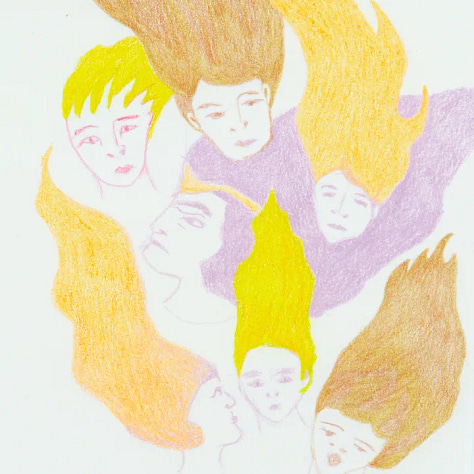
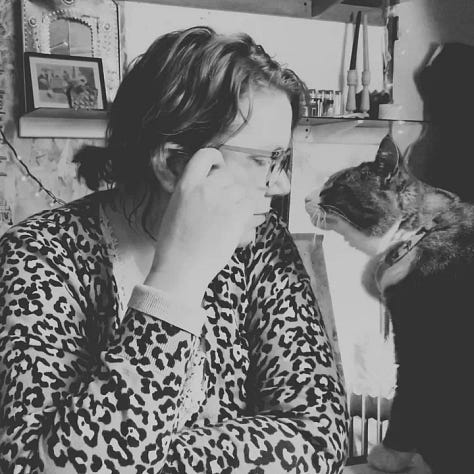
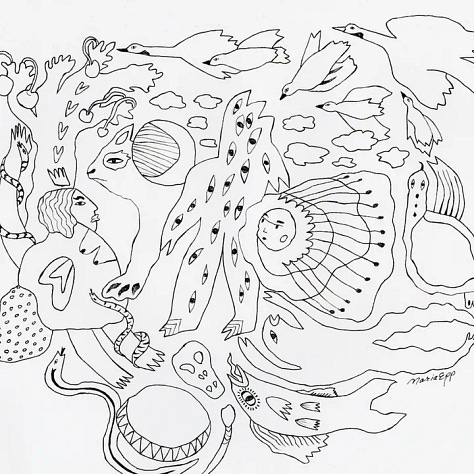
Maria Epp is an artist, a mother, and an advocate for those struggling with disability, both visible and invisible. Maria shares her art and writing online, also lending her energy to her local community in Winnipeg, Manitoba.
Her journey has been one that many white settlers can relate to on Turtle Island: uncovering the legacy of genocide and oppression, understanding what it means to practice active anti-racism, and using this knowledge to reconnect to community in a time of hyper individualism that doesn’t always make space for disabled folks.
Maria’s art in not only a tool for connection and storytelling, but for processing grief and exploring personal ancestry as well. You can find Maria's work and writing on Instagram at @MariaEppArt and on her Substack thehungryhouse.substack.com
Maria’s art and writing is also featured in the first issue of Novitas Magazine and you can read her piece, along with others, in that first issue available at https://www.novitasmag.com. There are a few copies still available if you’d like to order one.
You can support this project and podcast by becoming a paid subscriber here on Substack.
If you have a person or project who you think is doing really awesome work in their community, please recommend them by emailing me at kel@novitasmag.com.
Thanks for listening!
Notes: Maria’s mentioned Artbeat Studio and their residency program. You can find more info about Artbeat at https://artbeatstudio.ca
TRANSCRIPT (please excuse the typos)
Intro: Welcome to Novitas, a podcast that explores stories about living outside the capitalist paradigm towards collective liberation. Each podcast episode features a contributor from the print magazine, which you can find online at www.novitasmag.com.
Today's guest is Maria Epp, an artist, a writer, a mother and parent living in Winnipeg, Manitoba. Maria lives with hidden disabilities and mental health challenges. Her art and writing are a part of her journey to unpack the history of ableism she has experienced within the context of colonialism, white supremacy, and capitalism. I feel honored to have been on part of this journey with Maria since 2020 when we met online as part of a unschooling community. Maria's work speaks to me on many levels, as a parent, as a white settler living in so-called Canada, but also as someone who is working to undo the narrative of colonial culture on a deeply personal level, exploring history and ancestry, and finding the pieces of our own lineage, the ones that have caused harm, but also the ones that can help us reconnect.
Maria and I shared this conversation asynchronously, a different approach to dialogue that I really enjoyed. It allowed me time and space to consider her responses when thinking about the next question I wanted to ask. In a conversation centered around disability justice, it felt very liberating to adjust the interview format to meet our different needs. I hope you'll enjoy the conversation.
Kel: So if you could start by sharing a bit about yourself, anything that feels specifically relevant in relation to your piece in the magazine.
Maria: Thanks for having me on your podcast and for inviting me to join this incredible collection. I am really inspired by you. Yeah, my name is Maria Epp and I am a white woman from Manitoba, Canada.
I have two young people, 14 and 16, and I'm married to Nathan. We've been on a self-directed learning journey for sort of like almost as long as we've had kids. And we've also been on a journey of detaching from or facing ableism and disability since before I got married actually. It's basically always been a part of our family life. I guess I wanted to talk about this topic of disability as it pertains to the future because I just need to see myself and others with more visible our humanities are all welcome and celebrated and you know it's not like an exclusive club that gets to quote survive. So that's kind of where I wanted to come from and I wanted to give a bit of background on how hard it was to be a mom with young kids and to you know struggle in building resources and community and some of the struggles that a lot of moms that I talk with struggle with and just envisioning. I mean, I don't come up with that many answers as it comes as it pertains to parenting, but I do start to build. It's just a very, very small taste of what it might look like to not be rushing off to a office job or some location far away from where all your people are.
Kel: Yeah, for sure. Thank you. I think one of the reasons that I really love doing the magazine as an editor was that I was introduced to a whole bunch of amazing topics that I think about or on my periphery but don't always come to the forefront of my life because it's not something I deal with directly. So disability justice definitely falls into that category because I'm an able-bodied person. But I’m also like really aware and think it's really crucial. And we've talked about this before, that when we consider disability justice, specifically about like imagining in the future, there's this cool thing that happens where when we center people with disabilities and design systems and communities around those needs, we end up being super inclusive for even people who don't have disabilities and just creating like kind of better systems that meet the needs of more people. I wonder if it has to do because there's so many invisible ways that people are dealing with either mental or physical disability that we don't address. So when we build systems for our future that are more inclusive, we end up including more people than we maybe even originally intended to.
Maria: Totally, Kel. This has really radically changed the way I see the world, the way that I walk through the world, move through the world. And so much so, like, every time I embrace and accept, radically accept myself more, the more I expect the world to also embrace and focus and center on not only my needs, but the needs of all sorts of disabilities.
So we went to like a museum this summer and all I could look at was how is this space accessible? How is it accessible to children? How is it accessible for people with high sensitivities, people with mobility aids? Like I was just analyzing criticizing, critiquing, I guess, every aspect of the space. And I was overstimulated. So I was looking for places for escape and noticed that they did have a little quiet room where you could put a headphone on and block out the noise and stuff. Because even though it was a low lighting kind of environment, the noise level was pretty high because there was a lot of children.
The disability justice movement like within disability spaces is a multifacetedness to it. And so if I have fibromyalgia and you are autistic and deaf, like you're going to have very different needs than I am going to have. And so there's no monolith of like, this is what disability means, you know? But I think in general, yeah, like when we're centering the needs of more bodies, more people have access to spaces, which means more, there's a richer way for us to all experience the world.
Another example that like I don't really talk about in the paper, but I've run a community newsletter in Winnipeg here and we are like in a very low income neighborhood. And there's a high percentage of elderly who are often, they're kind of housebound and lacking like available like technology. So they are somewhat, one of the populations that this newspaper focuses on because we want to give them access to goings on, you know, like current events, community, you know, resources, phone numbers, ways to get their needs met. And so we do a printed version of the newsletter and it's the only one in the city and it's free. And so we basically say it's a low barrier access to community news. And I've never really seen it as part of disability justice except now I do because it is so like countercultural because a lot of the world moves to this digital online space, assuming we all have access to that and have money and have, you know, the technology brain that can like access the right pages and stuff.
So there's a lot of assumptions there, which isn't always the case for all of us, right? I guess this is where intersectionality comes in because as a white body person, I go into spaces and see the missing, you know, how are my needs not getting met? And then I feel emboldened to often speak up or, you know, speak up on behalf of my children and like feel a lot of privilege to have my voice heard. Not realizing that the things that I'm speaking up for might not be what is needed in my community. So to be very cognizant of the needs of all people, like of all races. I guess that's what I'm learning from the books and the authors that I'm reading, who are primarily black and brown. And they're talking about how the disability rights movement centered white disabled people and the disability justice movement is about centering black and brown BIPOC. Where are their rights and their bodies not allowed to go? Where are their voices not allowed to be heard? And centering that as the most important voice to lift up. So yes, my needs matter. And I'm able to focus on them because often in an able-bodied, ableist world, sanest world, everyone who has any kind of visible or invisible special need is discredited and, you know, ignored. But even within those spaces, it's really crucial to uplift and center the needs of BIPOC.
Kel: I love that it always comes back to this intersectional lens, even when, you know, we start from different angles that we always seem to come back to the same perspective that we can't just look at these different issues in silos, and we really, really need to explore them all together. So thanks for bringing that back as well. I wonder if you could talk a bit about how the role of art and writing has played into your journey as you've kind of gone through the process of uncovering all of these different issues and how, I guess that art has helped you process your own understandings, own grief, own place in all of it, I guess, and then how writing ties in as well.
Maria: Thanks for this question, Kel. I love that I'm able to reflect on this a little bit before answering and go down memory lane because it revealed to me like 25 years of, I mean my whole life, but 25 years as an adult where art and music and writing and creative expression have tethered me, kept me grounded, helped me process incredible grief, incredible depression and anxiety and all those really intense emotions while it continues, right? Like the art and the processing, it doesn't make it go away. It gives a portal to place it, to let it live in its darkness, in its sometimes desperation. There it is, like you can see it, you can feel it, and it can live somewhere outside of the tangled mess inside of our hearts. Like this sensitive part of our souls that needs someone to hold us, that needs words, that needs like imagery to express what words can't express.
And I think, I mean, there's a lot within abstract art that can do that because you can see mixtures of colors and shapes that represent so much more than a word could represent. And I think that's one of the gifts of art and writing and music is that you can speak your truth, you can find your truth within your creation, and not have to answer to anyone. You know, there's some freedom there.
Break: You are listening to the Novitas podcast and this episode is with Maria Epp, who is a contributor to the print magazine. The first issue was released in June 2024 and has contributions from different people all over the world sharing about what a post capitalist society might look like. You can find more information about the magazine on our website at www.novitasmag.com. Now back to the conversation.
Maria: I have seen art as a laboratory tool from an early age. Children have a gift of accessing their intuition without a lot of barriers in front. And art can do that, like for adults too, if we give ourselves the time and the, like if we remove our critical glasses that we have been trained into.
One of the ways that I was able to start pursuing art as a career was a residency for six months here in the city that was called Artbeat. And it is focused on giving adults who are struggling with mental health a place to create. So they were given a small studio, they were given this group of friends that they would meet with every week and ask each other how there was just an incredible camaraderie there. And through that experience, which my husband pushed me to go to, I could even like reckon with my own ableism and start to just start to see how my life with depression specifically was not going anywhere and was something that I'm gonna have to navigate.
And here was this incredible tool that I was drawn to that I could access community with. I could access healing and truth telling. Like I could access affirmation from the larger community. All of these things were incredibly life giving. And I don't think, I mean, we can access these things through like lots of mediums. But this kind of like self-expression is unique. I would say it's very quite unique in its intimacy level, right? And I'm just so, so grateful for that experience and the way that it's formed my heart and my beliefs and given me a vision for how we can be together as humans that we don't need to erase parts of ourselves to contribute, to be helpful. Yeah, it was transformational really. And that is still going on that program. If you ever wanna look it up, it's called Artbeat.
Kel: Thanks, Maria. That program sounds really cool. And maybe I will go and add some links in the podcast notes for people who might be interested in more information. I wrestle with the role of art in our culture and and weird part of me wants to like to credit art as useful or think about it as not as useful as like more direct tools of action and I waffle with this regularly and I'm really not sure why. Because when we talk about art as a tool for processing grief or, you know, education, there's so much that art can bring out when sometimes words don't suffice, right? And I think art is such a cool tool for being able to connect to each other and to ourselves in ways that other mediums or other tools just don't allow for. And I really hope that as we move into like a post-capitalist society, art has more of a central role. Um, because when we move kind of the financial barriers of what it means to create art and, you know, having it tied to a monetary value, I'm hoping that we can kind of all see ourselves as artists and I guess just use art as a way to process our own grief or our own challenges as we transition into a post-capitalist society. And so I wonder kind of what role do you think art might play in that, in a world without capitalism and how does art help us move beyond our current state of capitalism?
Maria: Whoa, that's a really huge question. Also exciting question and terrifying question because it's asking where do we as humans exist in this transformation? Because I don't see art and creativity as separate from being human because to be a human is to manifest, is to create symbols, create language, create a story really around what we are going through. Story is culture. And so then, yeah, you can look back throughout history and see kind of how story was used for harm, for good, and, you know, manipulated through powerful dictatorship, you know, because we create out of our emotions. And when that resonates with other people and connected and bonded and resolute to pursue whatever it is we're pursuing. And that could be a certain type of supremacy, or it could be a bonding around being oppressed and being the survivors. And how do we generate a feeling of wholeness and okayness within ourselves while under some kind of oppressor?
I think I struggle with the idea that we are fighting for a future. I don't know why I struggle with that word because I feel like it's antithetical to what it means to be a human, which is to thrive and to be filled with wonder and joy and thankfulness for, you know the abundance that is around us. And so out of that kind of wellspring arrives like our desire to make more beauty and to give thanks for that beauty. Like there's a lot of generativeness to creation, obviously. It's the opposite of destruction. So I guess that's where I find it hard when we say like fighting for something new, which is actually a generative action. I guess I hear the word fight and I think violence, I think, you know, pushing back resistance. But it's a forward motion, right? Like you said, like it's a forward motion. We're pushing towards a future without these hierarchies, without these oppressive tools that are putting people in cages, putting ourselves in cages. And so that's incredibly positive, but also a part of human nature is to get comfortable and to get like accustomed to our cages and to the things that we're used to because we're very habitual and to think outside of the four walls that we've been trained in takes a lot of courage, takes a lot of risk taking and a sense of safety almost. Well, not safety as in like, I feel safe enough to risk losing all of this, but safe within ourselves, like I am worth and we are worth enough. We feel that worth is strong within us to fight and push against these encroaching walls, like encroaching on our life force.
So I think as a creative myself, like who works in that field on a daily practice, I struggle immensely with maintaining a sense of self-worth against the tide that is coming against me, you know, thwarting that and like pressuring me into smallness, into quietness, giving up, depression, all of those things. And maybe the arts, and like I don't have answers, but maybe the arts are a way for us to link arms and to say we're not alone, we have each other and we are going to sing the songs together. We're going to dance the dances together. We're going to scribble on the walls. We're gonna like graffiti the walls together. We're like, we are gonna use our tools of creativity for resistance because we have so much love for each other. I posted recently, I said, are we at that tipping point yet? And I think we're all wondering and waiting and wishing for it. Like, when are enough people going to get fed up with business as usual, with the status quo, with pursuing the bigger dollars, the grind? Like, when are we going to be tired of it all, right, and see through it all? Oh, that is the ultimate question.
And I do love listening to other, like, thoughtful questioners who are interrogating these systems and are like watching what's happening, like watching the resistance take place, the mobs, the protests, the graffiti, like the destruction on public property, the theft, like there is this outrage that is growing. And with the outrage comes: This is protest art, right? Like, this is, we're getting the message out. We're doing a rally cry and that's where we're going to unite. And then there's, there's when you move past that and you say you get to the other side where you have just met, like everything has fallen apart. It's dismantled. Then you start to rebuild.
And what does rebuilding mean? Where does our culture making take place? And again, it comes back to story. What are our stories to tell? What are we trying to communicate to each other? Because art is just another communication tool. Like it's another extension of our language. You have seen a lot of my art that circles around kind of animist, indigenous, European thoughts and how did we live pre-Christian, pre-colonization. I mean, there was always oppression of some kind, but it was much more tribal. And we were once connected with the land and with the animals and with the spirits, especially seasonal spirits. And I really am fascinated by, like not just through a colonizer lens, like, oh, let's go back and take from our past ancestors. But I see that mystery and that intelligence with like the connection with the land as integral to our sustaining life force.
And I have in the past tried to create art that reflects on that to hearken us back to that time, I guess. But I have to be careful because I don't want to realize a sort of white supremacy where it's like European romanticism, right? Like where it's like, oh, we all need to be witches and create ceremonies like we used to and bring back the old goddesses and gods. Some people are really excited about that. I don't feel as much inclination towards that. I definitely feel more inclination towards being on the land and the place that I currently am and letting the land teach me from where, not just me, but teach all of us.
So I feel like we do need a rebirth. I guess I'm kind of against world travel. That is quite controversial, I'm sure. Yeah, I just really see the importance of like being rooted and grounded and not being hyper mobile and building your culture around the seasons, the foods, the animals, the life ways that are right here and letting your language come from that, letting your expression your creative expressions come from that. So that's how I envision the future. And that's probably why in my piece I wrote about the nettles because they do grow here, actually in my garden right now and I need to harvest them. And I guess that's where this countercultural revolution could be birthed from is not only just resistance, but of placemaking with the people that we are in proximity to who may not look like us, may not have the same ancestry as us. But it's like we get the opportunity to learn together almost from scratch.
And just the last piece: I spend a lot of my time online and a lot of my art practice is dispersed through that medium. But as I think about the internet and the world of information, I do feel like it's very human-centric and it is not giving us access to learning from other species and I guess other languages. Like we spend so much of our time learning from other humans, you know? And it's not giving us a full picture of what it means to live on this earth. So maybe that's where you're feeling the pull away from creating more artwork and stuff. And you're saying, can we just stop? And can we watch and learn from the plants and the insects and the birds and the animals and let the creation that's already existing give all the knowledge and truth that we need and let's just rest in that.
Outro: Thanks for listening to this episode of Novitas with Maria Epp. You can find Maria's work and writing on Instagram at @MariaEppArt and on her substack, thehungryhouse.substack.com. If you'd like to read Maria's contribution to the magazine, there are still a few copies of the first issue left online at www.novitasmag.com. If you'd like to support this podcast, please consider becoming a paid subscriber on the substack at novitas.substack.com where I also publish additional essays exploring what it means to be alive in late-stage capitalism. My name is Kel Smith and it's been such a pleasure to share this conversation with you. If you're interested in contributing to a future issue of the magazine, feel free to reach out at kel@novitasmag.com.








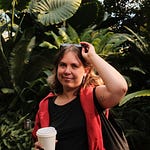
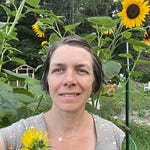

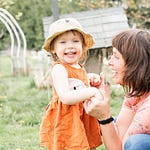
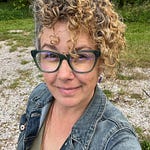


Share this post